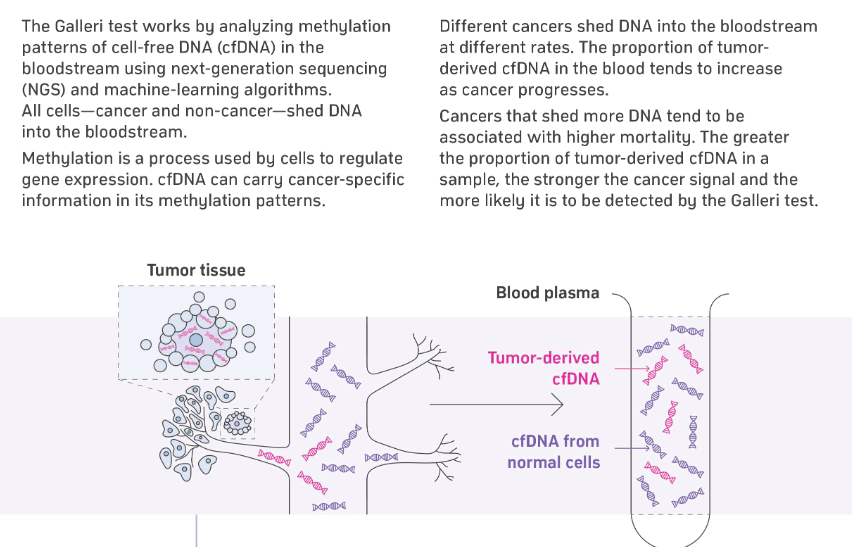Cancer is a significant cause of death in the US. According to the CDC, 1.7 million cancers were detected in 2019. For every 100,000 people, 439 cancers were detected, and 146 people died of cancer.
There are cancer screening exams and blood tests for skin, breast, cervical, ovarian, colon, and prostate cancers. For those susceptible, lung and liver screening exams are also available. These test have proven great worth in detecting cancer, hopefully in early and treatable stages. Unfortunately, there are not screening exams for every type of cancer. Sadly, 71% of cancer deaths are from cancers not commonly screened for.
New technologies are also helping to detect more cancers. The Galleri test is a multi-cancer detection blood test that uses DNA analysis to screen for over 50 types of cancer. Although no screening test is 100% accurate, Galleri is expanding the possibilities for detecting more cancers, and in earlier stages.
How it works: healthy vs cancer DNA detection by Galleri

Watch a video HERE (see bottom of that webpage) to learn how this test works.
The stats according to Galleri:
- Finding it early to treat early. When detected early, cancer 5-year mortality rates are low at 11% as compared to late detection 5-year mortality rates of 79%.
- Specificity is 99.5%. This means that the false positive rate: is 0.5%. If the test returns as negative, more than likely, there is no cancer.
- 76.3% sensitivity ( a true positive) for the 12 cancers responsible for 2/3 of all cancer deaths. These cancers include anal, bladder, colon/rectum, esophagus, head/neck, liver/bile duct, lung, lymphoma, ovary, pancreas, plasma cell neoplasm, and stomach.
- For all 50 cancers screened, there is a 43.1% positive predictive value of cancer present. The positive predictive value drops from 76.3% to 43.1% due to the difficulty in obtaining DNA from some tumors, including prostate and thyroid.
- 89% of tests were able to detect the correct originating organ producing the cancer.
Galleri is not a substitute for regular cancer screening, but can add quality information to influence your health decisions. Galleri is not FDA approved and may not be covered by your insurance. If cancer is suggested by this test, confirmatory testing is suggested.
Dr. Rodgers is offering this test to patients 50 years and older.
List of research:
Klein EA, Richards D, Cohn A, et al. Clinical validation of a targeted methylation-based multi-cancer early detection test using an independent validation set. Ann Oncol. 2021;32(9):1167-1177. doi:10.1016/j.annonc.2021.05.806
Nadauld LD, McDonnell CH 3rd, Beer TM, et al. The PATHFINDER Study: Assessment of the Implementation of an Investigational Multi-Cancer Early Detection Test into Clinical Practice. Cancers (Basel). 2021;13(14):3501. Published 2021 Jul 13. doi:10.3390/cancers13143501
